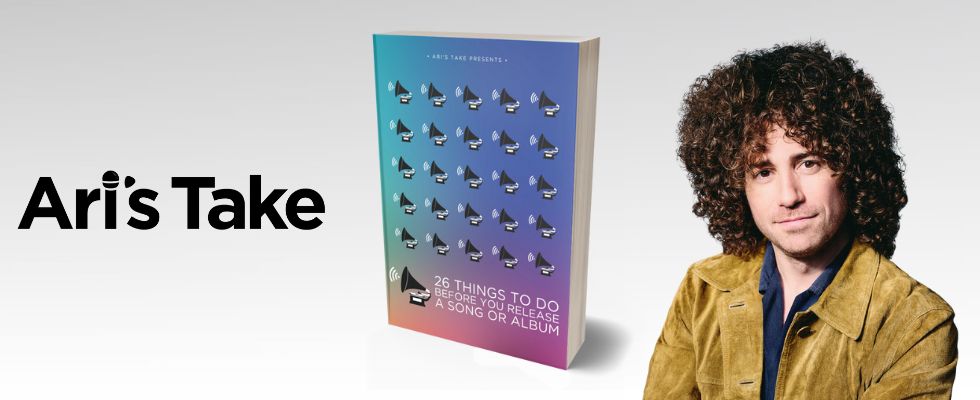This is an excerpt from my new book, How to Make It in the New Music Business THIRD EDITION.
The manager is the most important person in your operation.
Your manager is your teammate. Your partner. Your friend. The two of you (or six, depending on how many are in your band) are in it together. Us versus the world. The manager is the liaison between the artist and everybody else. The manager oversees everything from the recording process to the album release campaign to the tour routing, booking and performing to the social media management to the lead singer’s divorce.
The manager handles the business, first and foremost. The best managers handle the business with creative finesse. To navigate the constantly evolving musical landscape, managers need truly creative minds. You don’t want a manager who is operating the same way this year as she was last year. Every day is new. Every day is different.
+Because Labels Don’t Develop Artists, godmode Steps In
Finding a manager is about timing, being in the right place at the right time and, really, making it seem like you don’t need a manager.
No one wants to work with a band that seems to be struggling, but everyone wants to hop on a speeding train. That being said, music is magic. Managers believe this. It’s why they chose such an unstable career path. If a manager happens to hear something so special that it moves them on a deep, spiritual level, he may decide to take you on no matter what the stage of your career. Even if this is your first demo on SoundCloud and you don’t even have a TikTok yet.
But this is rare.
Most managers want to see you kicking butt on your own before they will even give you a second glance. They want to know that if they decide to work with you that you will put in the effort needed to maintain a modern music career. Managers know that it’s not just about the music. They want bands who will work hard, just like them.
So, you should have all of your social media sites up to industry standards. You need high-quality video. You need professional promo photos. You need your live show to be better than bands that are selling out arenas. You need to look like a band ready to take over the world.
+How To Get Your Music on Netflix (and Other TV Shows)
Managers typically only make money when you make money. Most managers take between 15-20% of your gross. So if you’re not making any money yet, most managers won’t really be able to work with you. They gotta eat too! Remember, as much as they may love you, they need an artist with a business to manage. A business that brings in enough revenue to pay them for their work too. So remember this before even thinking about approaching managers for possible representation.
Whatever you do, don’t sign with a manager just to have a manager.
I meet too many artists who love talking about their “manager.” “Oh yeah my manager is handling this. My manager is handling that.” Blah-blah. Unimpressive. I don’t care. If your manager really was handling this and that, you wouldn’t need to tell me about it and I’d see it. And your manager should never be handling stuff you don’t know about. The moment your manager makes deals that you have no idea about is the moment your career becomes their career and you lose all control. Do not wear your ignorance as a badge of honor and proudly exclaim, “Oh I don’t know, my manager deals with that.” No! You’re the boss. You’re in charge. You should know everything that goes on. Your manager works for you. Stay in the loop. Stay hands-on.
There are a few concrete steps you can take, when you’re ready, to get your music in front of managers.
1. Get Included on Spotify Playlists
Spotify has become the new discovery mechanism for music industry professionals. Ten years ago it was Hype Machine and blogs. There are many playlist plugging strategies out there you can master to get on user-generated playlists, and your distributor may be able to help you get into official editorial playlists. You should also submit all of your new releases directly to Spotify via the submission portal in Spotify for Artists.
The more playlists you get added to, the better chance your music will show up on managers’ Discover Weekly, Radio or other personalized and algorithmic playlists.
+Streaming and Instagram Growth (COURSE)
2. Social Media
OK, you have to be somewhat sneaky about this so as to not seem stalky or desperate. But once you figure out which managers might be a good fit for you, you can follow them on socials, Like their posts, watch their stories, see which artists they are interested in and following. Possibly collaborate with those artists (if you’re in the same scene). Show up on their feeds—which this manager follows. Cover the songs of this manager’s artists (tag the artist and use the appropriate hashtags). This is actually how Emily King’s former manager, Andrew Leib, discovered Victoria Canal and subsequently asked her to open Emily’s show at the Apollo Theater in NYC (and eventually repped Victoria).
Getting one of your songs trending on TikTok will also, of course, bring lots of industry eyes (and contracts) your way.
Easier said than done, of course. But oftentimes, songs and artists bubble up below the threshold for label A&R, but would definitely put you on managers’ radars. If you’re active on TikTok and are starting to build a following there, chances are, potential managers will start to take notice.
+How To Crack TikTok (From the Major Label Experts)
3. A Lawyer
A more traditional way to get in with well-connected managers is from referrals from respected entertainment attorneys.
+Spotify Says Songwriters Make More From Streaming Than They Did From CDs
4. Direct Contact
If you’ve done your homework, you can email a manager directly with links to your material. Begin the email with compliments and express why you think you would be a good fit together; there’s a chance the manager may dig in. Remember, you are bringing value to them. Respect their expertise and experience, but understand that you have something they don’t—amazing music.
+How Tai Verdes Went From TikTok to Top 40 (Conversation With His Manager)
5. Showcases
Many public radio stations, blogs, magazines and music conferences will hold showcases where they will invite managers out. Be careful, though; there are shady promoters and “talent buyers” who will try to get you to pay to play their “showcases,” which are nothing more than regular club shows where you have to buy advance tickets to sell to your friends and fans. Do not take the bait. With legitimate showcases, you have to be invited to play. Many will have a submission process. Most won’t pay, but they won’t make you pay either. If you have to pay, make absolutely certain you know the names of the people who will be there. “A&R” and “music managers” is not good enough.
6. Public Radio
It’s nearly impossible to get played on top 40 radio or other Clear Channel–owned stations without a big-time radio promoter. But NPR affiliate stations will regularly play local, indie and unsigned artists. Start with the stations in your town or the closest city to where you live that has a public radio station that plays music. Managers definitely tune in to discover new talent. One of the biggest music-based public radio stations is Los Angeles’s KCRW, which gets over 550,000 listeners each week. They play pretty much every kind of music except mainstream pop. Study the music played by each DJ. DJs at KCRW (and most other public radio stations) have the autonomy to play whatever they want. So instead of submitting through the front door, go directly to the DJs who are playing music like yours. Be smart about this and do your research. Some DJs only play 1970s funk/soul, so don’t submit your metal band’s latest song to them.
7. Business Schools
If you’re near a business school, target your promotional efforts to these students. Promote your shows on campus and in the business school building. The business students who are interested in music management may come out to your show and offer to manage you.
Grab the new edition of How to Make It in the New Music Business here.
















